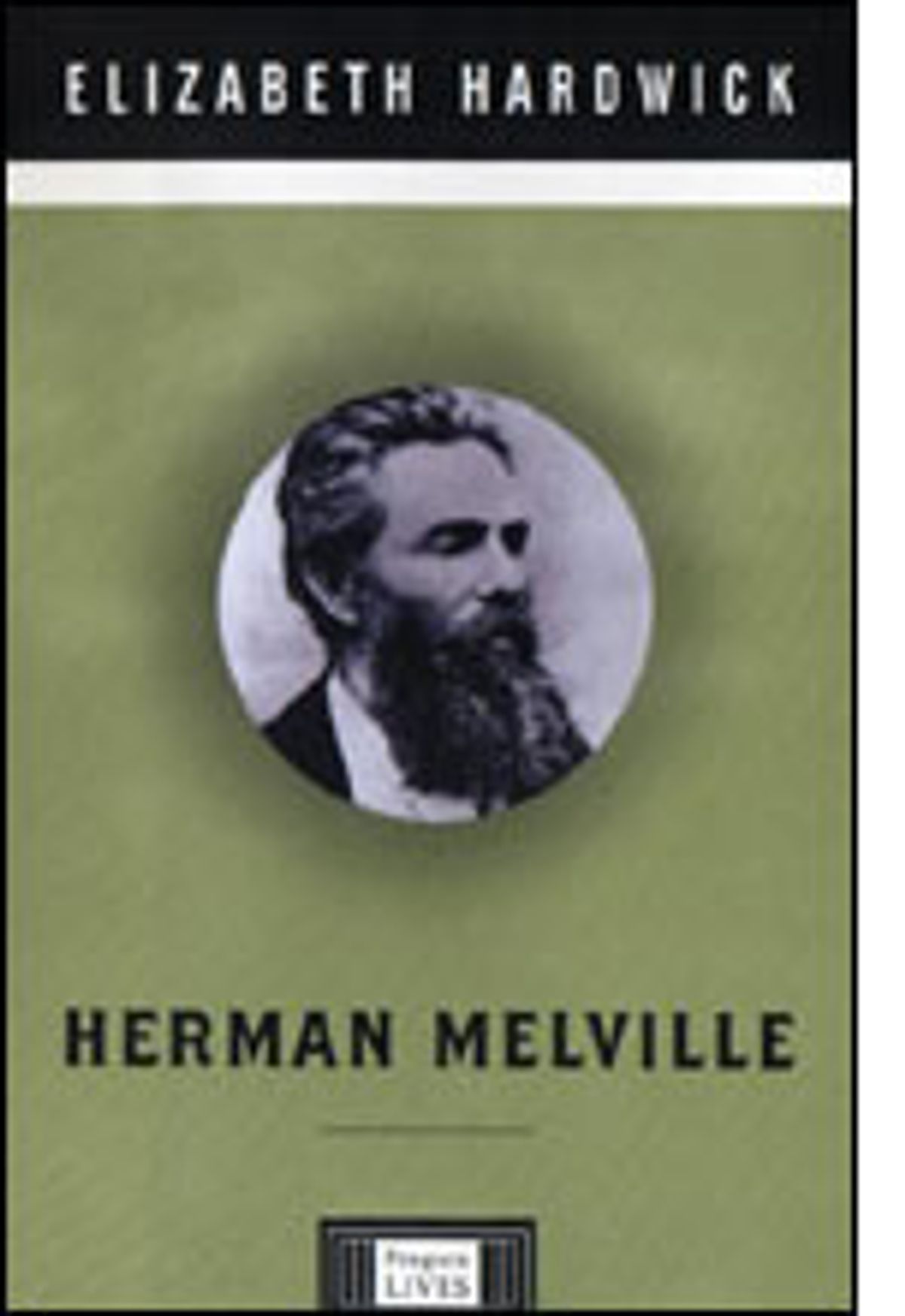Literary critic Elizabeth Hardwick can be forgiven for being stingy with the facts in "Herman Melville," part of the Penguin Lives series of short biographies. After all, Volume 1 of Hershel Parker's immense, minutiae-filled Melville biography was published recently, in 1996. In some ways, Hardwick makes her book an argument against the very practice of biography. Throughout, she insists on Melville's unknowability: "He is elusive, the facts of his life only a frame ... This often unhappy man knew many happy days; or was it that this more or less settled gentleman had periods of desolation? All is true, if you like." Hardwick concentrates on Melville's writings, filling in (and often repeating) biographical information as she deems it relevant. The result is a forceful, looping, eccentric little book that paints a dead-on, if highly abstract, portrait.
Not surprisingly, Hardwick makes short work of the first 20 years of Melville's life. (With a single stroke, for example, she accounts for the appearance of his younger siblings: "More children were born.") Melville's parents both came from prominent families, yet they had endless financial problems -- the Melvilles "seemed to have a genetic disposition to bankruptcy," as Hardwick puts it.
Herman, born in 1819, was 13 when his father died unexpectedly, leaving the family penniless. "Things should have gone better for them," Hardwick notes, in one of her many strikingly apt broad-brush images: "They give the feeling of a defeated nation or, more exactly, of certain European families with fading title, handicapped by the sweep of history or by maladaptation."
Hardwick swerves backward and forward in time, and in and out of critical debates. Like most great critics, she has an eclectic method that's difficult to pin down. While she criticizes psychobiography, for example, she uses Melville's early struggles to find her way into a fascinating discussion of his fourth novel, "Redburn," which tells the story of a well-born boy's lowly service on a ship bound for Liverpool, England. Hardwick shows how Melville's own loneliness, grief for his dead father and anxiety over his crushing family burdens are on poignant display in the novel.
Appraising Melville's first book, "Typee," which garnered him short-lived celebrity for its blithe depiction of his experiences living among supposed cannibals after he'd jumped ship, Hardwick discerns the seriousness, the hint of some deep disturbance, beneath the book's lighthearted, adventuresome exterior: "'Typee' is a fierce work despite the pastoral mode of many scenes," she writes. "The summery, green and golden island is overlaid with a bleak, primitive and repetitive rhythm."
Melville was 32 when he wrote "Moby-Dick," his fifth book; he had a wife and a son, another child on the way and very dubious prospects of ever supporting his family through his writing. The book, of course, turned out to be his masterpiece, a heady combination of wildness and discipline, "a work tantalizingly subversive," as Hardwick nicely puts it, "and yet somehow if not affirming at least forgiving of the blind destructiveness of human nature and of nature itself."
The year in which he wrote "Moby-Dick" was also the year Melville fell hard for his Berkshires neighbor, Nathaniel Hawthorne, and Hardwick is devastatingly perceptive about the younger Melville's pursuit of and eventual rejection by the author of "The Scarlet Letter." Melville's excitement at finding a kindred spirit inspired him to write heated letters -- "Whence come you Hawthorne? By what right do you drink from my flagon of life? And when I put it to my lips they are yours, not mine" -- that seem to have scared away the more guarded, emotionally subdued (and more happily married) Hawthorne. Hardwick suggests that this disappointment, which coincided with the critical and commercial failure of "Moby-Dick," left Melville heartsick and in a sort of social and philosophical retreat for the rest of his life.
Jumping off from this complicated emotional business with Hawthorne, Hardwick devotes a good portion of her short book to the question of Melville's homoeroticism. It's a gamble that pays off. She'd never be so flat-footed as to say Melville was gay, since there's no evidence of a physical relationship with another man, but she does tease out deep meanings from his obvious fondness for filling his books with homoerotic images and joyfully charged relationships between men. (Who can forget "Squeeze! squeeze! squeeze! all the morning long; I squeezed that sperm till I myself almost melted into it; I squeezed that sperm till a strange sort of insanity came over me; and I found myself unwittingly squeezing my co-laborers' hands in it, mistaking their hands for the gentle globules.")
For Hardwick, Melville's homoeroticism and his lifelong spiritual questing are cut from the same cloth: In the possibilities of love and communion between men, she suggests, Melville expressed his high spiritual ideals, imagining a realm of human freedom, passion, mutual responsibility and dignity. Yet failure and a stubborn loneliness took their toll, and Melville's ideals eventually transmuted into a measured skepticism. At his death at age 72, Hardwick sees in Melville a "backhanded, cool acceptance of his destiny, pride in failure, which he capitalized as a kind of deity."
The notion that one's subject ultimately defies understanding can be a convenient out for the critic or biographer who feels unequal to her task. Perhaps Hardwick's most extraordinary achievement in "Herman Melville" is how she conveys a subtle understanding of Melville's heart and spirit while insisting that she wouldn't dare try to grasp them. We get a glimpse of great genius that's satisfying even as it leaves the mystery intact.



Shares